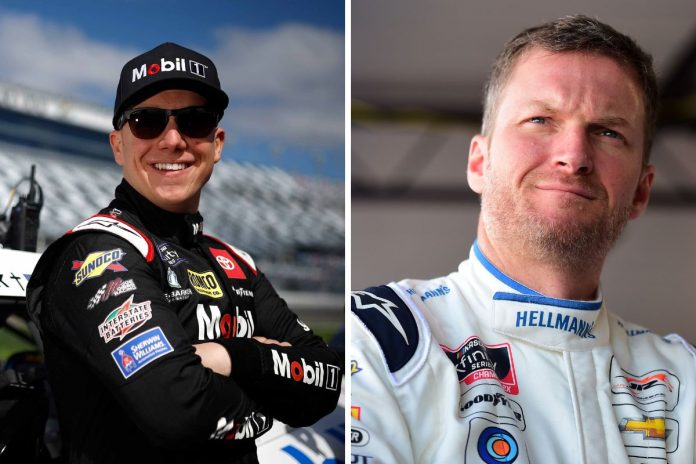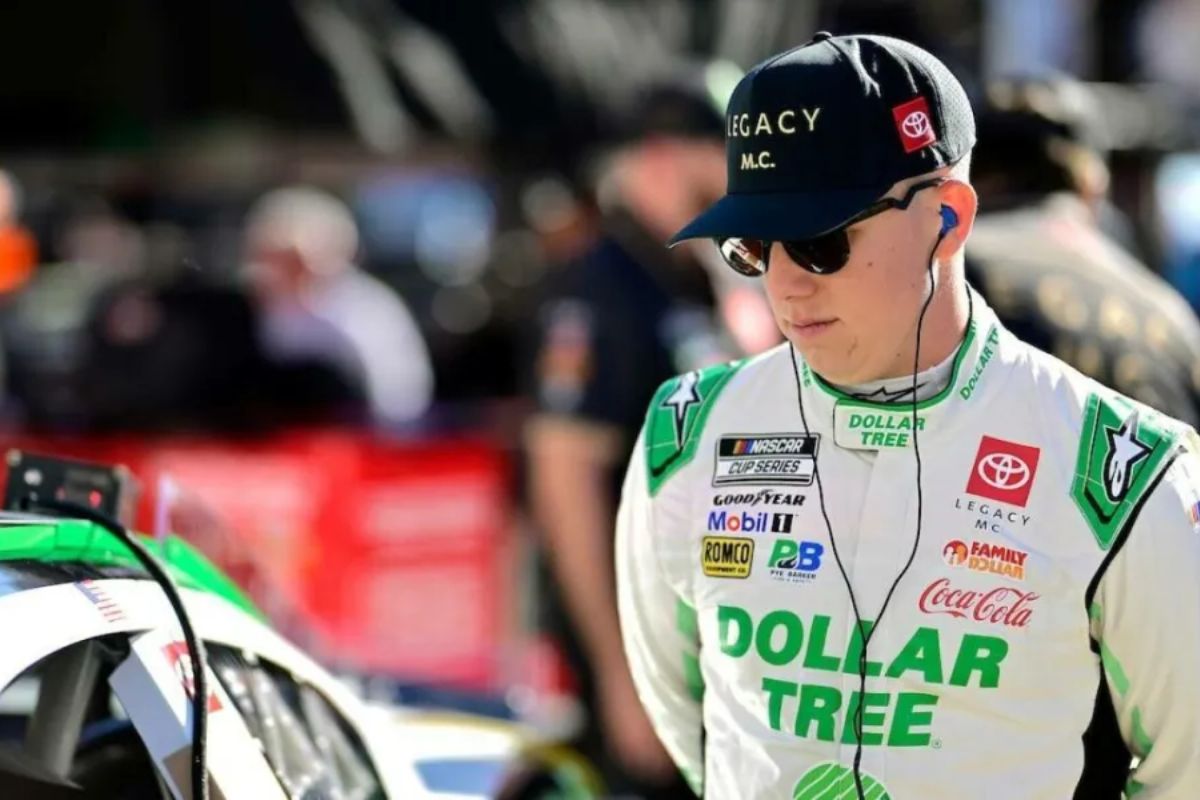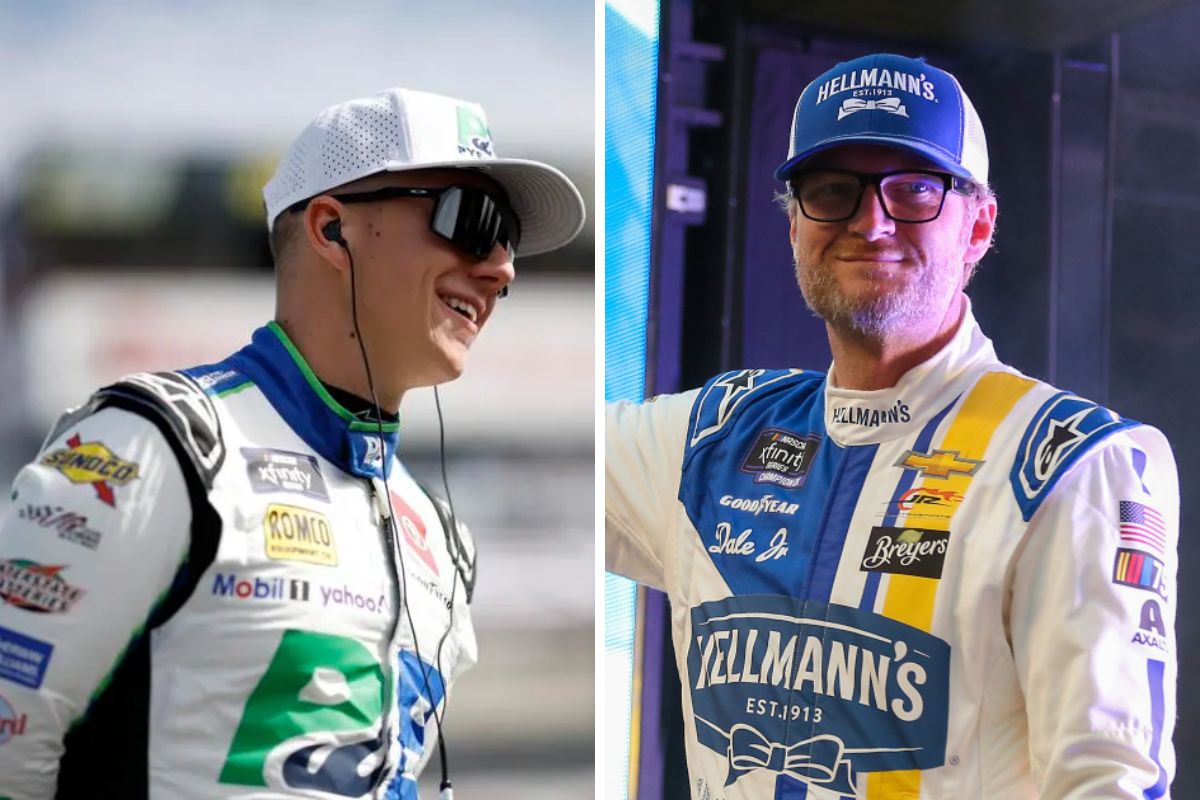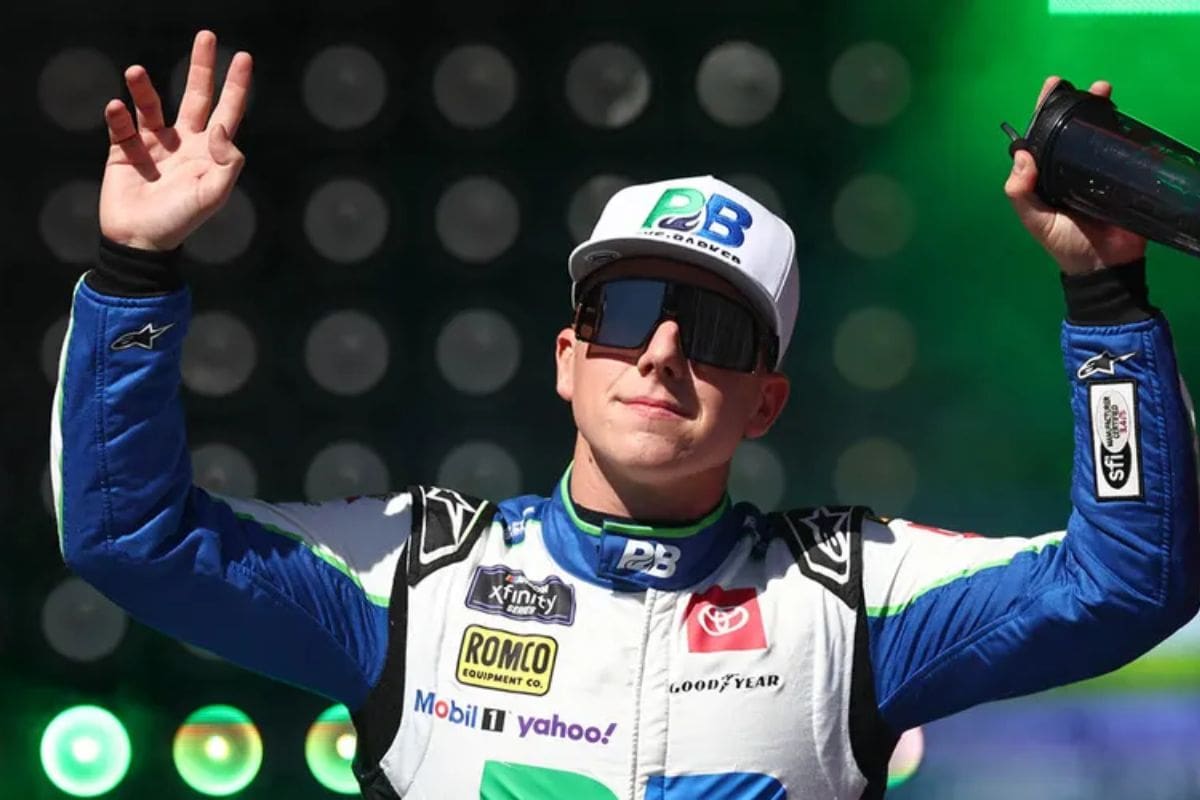NASCAR Veterans Roast Nemechek: In NASCAR, the recent critique leveled at John Hunter Nemechek by seasoned veterans, comparing his performance unfavorably to Dale Earnhardt Jr.’s in 2004, sparks a broader conversation about the challenges and expectations placed on emerging drivers. This comparison not only highlights the steep learning curve faced by newcomers but also raises questions about the role of veteran guidance in shaping the next generation of racers.
Key Takeaways
- NASCAR veterans criticized Nemechek’s performance at Talladega, comparing it unfavorably to Dale Earnhardt Jr.’s 2004 race.
- The Door Bumper Clear podcast highlighted Nemechek’s lack of tactical expertise and race awareness.
- Experts pointed out Nemechek’s risky drafting strategy that contributed to a major wreck.
- Veteran spotters questioned Nemechek’s spatial awareness and communication with his team.
- The critique emphasized the need for Nemechek to develop psychologically and emotionally to meet racing demands.
Nemechek’s Talladega Misfortune
At Talladega, John Hunter Nemechek’s hopes for redemption were swiftly dashed by yet another disappointing finish. Coming off a season where his performance oscillated between promising highs and concerning lows, Nemechek entered the race with a palpable need to stabilize his trajectory. The podium finish at COTA was a highlight, showcasing his potential in Jimmie Johnson’s Legacy Motor Club. However, subsequent DNFs at Martinsville and Texas painted a starkly different picture, one of inconsistency and unmet expectations.
Talladega, known for its unpredictability and the significant challenges it presents, was seen as a critical moment for Nemechek. A strong finish could have served as a catalyst, potentially igniting a series of performances that aligned with the early promise he had shown. Instead, the race added another layer of complexity to his season’s narrative. The result at Talladega was not just a missed opportunity; it was a continuation of a pattern that seemed to be emerging for Nemechek—flashes of brilliance overshadowed by periods of underperformance.
Criticism from Door Bumper Clear Podcast
Following the turbulent events at Talladega, the Door Bumper Clear podcast did not hesitate to critique John Hunter Nemechek, particularly highlighting his failure to emulate Dale Earnhardt Jr.’s legendary 2004 performance at the same track. The podcasters, seasoned veterans of NASCAR commentary, dissected Nemechek’s approach, contrasting it starkly with the high benchmark set by Earnhardt Jr.
“There was a point yesterday when the leader was out front, and I don’t remember if it was McDowell or who it was, but Clint made the comment of, this guy’s doing a great job of managing the runs behind him to stay in the lead. They’re running at a hundred and seventy-three miles an hour and I’m like, “What the f*** are you talking about?” I’ll probably text him.”-Griffin
The conversation was not just a comparison of driving skills but an exploration of situational awareness and strategic expertise, qualities that Earnhardt famously optimized during his reign at Talladega. The podcasters pointed out that while Nemechek possesses raw talent, his execution at critical points lacked the seasoned polish observed in legendary performances.
Door Bumper Clear’s Take on Nemechek’s Driving
The Door Bumper Clear podcast delivered a sharp critique of John Hunter Nemechek’s performance during the GEICO 500 at Talladega, spotlighting his strategic missteps in a critical moment of the race. The hosts dissected the sequence leading up to the chaos on lap 157, particularly focusing on Nemechek’s decision-making while running in a tightly knit pack. This analysis highlighted an apparent deviation from ideal racecraft, which could have influenced the subsequent events on the track.
The critique pointed out that Nemechek, perhaps under the strain of maintaining his forward position, might have overestimated the stability of his surrounding pack, which consisted of seasoned drivers such as Denny Hamlin, Bubba Wallace, and Erik Jones.
Spotters’ Perspective on Nemechek’s Wreck
Veteran spotters were particularly unimpressed with John Hunter Nemechek’s performance at Talladega, especially highlighting his role in the major wreck that greatly compromised his race outcome. The criticism was sharp and unforgiving, with comparisons being drawn to NASCAR legends, which only highlighted Nemechek’s shortcomings further. Brett Griffin’s honest commentary post-race illuminated the spotter’s essential role and Nemechek’s erratic actions leading up to the crash.
"A good plan gone wrong."
Here's what happened: https://t.co/AR82NWHMPJ pic.twitter.com/umNcyyc2GE
— FOX: NASCAR (@NASCARONFOX) April 21, 2024
The analysis from the spotters’ booth suggests that Nemechek’s spatial awareness and communication might have been lacking. This observation is critical because a spotter’s primary role is to provide drivers with the awareness they need to make split-second decisions at high speeds. Griffin’s remarks indicated that there might have been a breakdown in this vital communication at a decisive moment.
| Aspect | Griffin’s Observation | Typical Spotter Feedback |
|---|---|---|
| Communication | Implied lack of timely warnings | Constant, clear updates |
| Driver’s Actions | Erratic swerving just before the crash | Smooth, strategic positioning |
| Race Outcome | Major wreck, finished outside top 30 | Aim for top finishes |
| Spotter Involvement | Questioned spotter’s role during the incident | Integral, supportive presence |
Spotter’s Role and Nemechek’s Future
Analyzing the crucial role of spotters, John Hunter Nemechek’s racing future hinges greatly on improved communication and strategic guidance from his team. The recent debacle at the GEICO 500, where spotter errors were highlighted, emphasizes the necessity of airtight collaboration between driver and spotter. In high-stakes environments like NASCAR, where split-second decisions dictate success or catastrophic failure, the spotter’s role transcends mere oversight—it becomes a linchpin in the driver’s strategic arsenal.
The lapses at Talladega tri-oval track, as dissected by veteran spotters, reveal a pattern of missed cues and delayed communications. These mishaps, which led to back-to-back DNFs (Did Not Finish) for Nemechek, not only erode a driver’s confidence but also dim his prospects in the fiercely competitive racing landscape. It’s imperative, hence, that Nemechek’s team recalibrates their approach to spotter-driver interactions. This involves rigorous training sessions aimed at enhancing situational awareness and refining the protocols that govern their exchanges during races.
News in Brief: NASCAR Veterans Roast Nemechek
The criticisms directed at John Hunter Nemechek by NASCAR veterans, particularly the harsh comparison to Dale Earnhardt Jr.’s 2004 performance, highlight the essential role of tactical skill and race awareness in motorsports. Such feedback, although severe, is vital for Nemechek’s professional development.
It is imperative that he internalizes these insights and focuses on enhancing his strategic expertise. This reflective process will be critical for Nemechek’s growth and his potential future successes in the competitive arena of NASCAR racing.
Our Reader’s Queries
Q. Did Joe Nemechek ever win a NASCAR race?
A. Joe Nemechek embarked on his NASCAR journey 27 years back. Over this span, he clinched victories in four Sprint Cup races and triumphed in 16 Xfinity races. Notably, he secured the Xfinity Series championship in 1992.
Q. What happened to Joe Nemechek?
A. Following his emergence from the coma, Joe Nemechek experienced a resurgence of brain swelling. Despite medical efforts to alleviate the swelling through additional surgery, the outcome proved futile. Tragically, Nemechek passed away at 11:30 a.m. due to “uncontrollable brain swelling secondary to severe brain injuries,” as reported by Dr. Stephen E.
Q. Is John Hunter Nemechek the son of Joe Nemechek?
A. He’s a regular contender in the NASCAR Cup Series, piloting the No. 42 Toyota Camry XSE for Legacy Motor Club. Additionally, he engages part-time in the NASCAR Xfinity Series, commanding the No. 20 Toyota Supra for Joe Gibbs Racing. Notably, he follows in the footsteps of his father, NASCAR driver Joe Nemechek, and boasts the title of the 2012 champion in the Allison Legacy Series.
Q. How many NASCAR wins did Joe Nemechek have?
A. In his illustrious 33-year career, Joe secured victories in four Cup races and triumphed in 16 Xfinity races. On the other hand, John Hunter, aged 26, has notched up an impressive tally of seven Xfinity wins and 13 triumphs in the trucks series over a span of six years.
ALSO READ: John Hunter Nemechek’s Crash Course Confession: Next-Gen Realities





